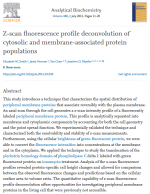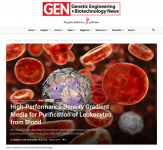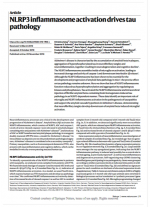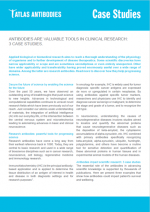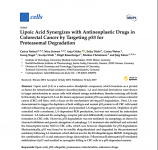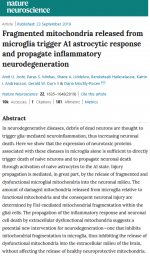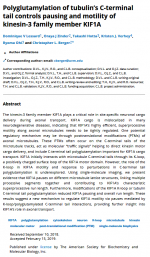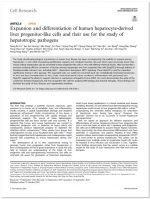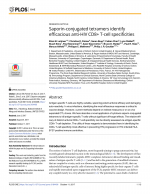18.12.2019
Z-scan fluorescence profile deconvolution of cytosolic and membrane-as... Analytical Biochemistry, 2015
The Extracellular Matrix (ECM) is composed of collagen, non-collagenous glycoproteins and proteoglycans. These components are secreted from cells to create an ECM meshwork that surrounds cells and tissues. The ECM regulates many aspects of cellular function, including the cells' dynamic behavior, cytoskeletal organization and intercellular communication. Fibronectin and Laminin constitute the majority of the dynamic portion of the extracellular matrix of tissues and they are essential components of the culturing technique of many cell types. ...
02.12.2019
High-Performance Density Gradient Media for Purification of Leukocytes... Engineering & Biotechnology, 2019
An article in Genetic Engineering & Biotechnology written by Shanghao Li, PhD and Miodrag Micic, PhD, ScD, describes formulations that isolate mononuclear and polymorphonuclear leukocytes with high yield and viability. The article titled “High-Performance Density Gradient Media for Purification of Leukocytes from Blood” can be read in its entirety below. Isolation of viable mononuclear and polymorphonuclear cells from blood serves as the starting point for a wide spectrum of immunology and cell biology studies. Unlike red blo...
27.11.2019
NLRP3 inflammasome activation drives tau pathology Nature, 2019
The NLRP3 inflammasome links two major components of Alzheimer’s desease: amyloid-β and tau protein, as recently reported by scientists from German Center for Neurodegenerative Diseases (DZNE) and the University of Bonn. Amyloid-β plaques can activate the NLRP3 inflammasome which in return can result in additional amyloid-β deposits. On the other hand, NLRP3 inflammasome phosphorylates tau, resulting in tau aggregates within neurons. This ambilateral impact of NLRP3 inflammasome in the pathogenesis of tauopathies has been describe...
19.11.2019
ANTIBODIES ARE VALUABLE TOOLS IN CLINICAL RESEARCH: 3 CASE STUDIES Atlas Antibodies, 2019
Applied biological or biomedical research aims to reach a thorough understanding of the physiology of organisms and to further development of disease therapeutics. Some scientific discoveries have narrow applicability or scope and are sometimes serendipitous or even entirely unexpected. Other have wider applicability and transferability having proved enormously useful over a wide range of domains. Among the latter are research antibodies. Read more to discover how they help progressing science. Secure the future of science...
15.11.2019
Lipoic Acid Synergizes with Antineoplastic Drugs in Colorectal Cancer... Cells, 2019
Abstract Lipoic acid (LA) is a redox-active disulphide compound, which functions as a pivotal co-factor for mitochondrial oxidative decarboxylation. LA and chemical derivatives were shown to target mitochondria in cancer cells with altered energy metabolism, thereby inducing cell death. In this study, the impact of LA on the tumor suppressor protein p53 was analyzed in various colorectal cancer (CRC) cell lines, with a focus on the mechanisms driving p53 degradation. First, LA was demonstrated to trigger the depletion of both wildtype and...
13.11.2019
Fragmented mitochondria released from microglia trigger A1 astrocytic... Nature Neuroscience 22, 2019
Efforts to reduce the personal and societal burden of neurodegenerative disease (ND) hinge on the identification of the underlying molecular mechanism(s) that causes neuronal death. One common aspect of neuronal death in Alzheimer’s disease (AD), amyotrophic lateral sclerosis (ALS), and Huntington’s disease (HD) is the relationship to the buildup of neurotoxic proteins. Glial cells, normally neuroprotective, can be transformed into a neuroinflammatory state (“A1” for astrocytes) stimulated by this neuronal detritus and by micro...
13.11.2019
Polyglutamylation of tubulin's C-terminal tail controls pausing and mo... Journal of Biological Chemistry, 2019
Recently, Lessard et al. investigated how polyglutamylation of tubulin’s C-terminal tails (CTTs) regulates processivity of the neuron-specific kinesin motor KIF1A. KIF1A transports neuronal cargo anterogradely along axonal microtubules (MTs) over long distances (~3 microns). Prior studies implicated interactions between the K-loop of KIF1A and polyglutamylated CTTs in the regulation of KIF1A motility. The K-loop is a lysine-rich surface loop that attaches the motor to MTs via interactions with glutamate-enriched tubulin CTTs. Single-molecule tot...
13.11.2019
Expansion and differentiation of human hepatocyte-derived liver progen... Cell Research 29, 2019
What is it that makes stem cells such an attractive option for drug discovery studies? One of the main reasons is that they make a much better model of human disease and drug reactions than animal models. The development of an in vitro experimental setting to generate human liver progenitors either from hepatocytes or from cholangiocytes will be of great importance. Fu et al. report an approach for efficient expansion and differentiation of human hepatocyte-derived liver progenitor-like cells in vitro that relies on active SIRT...
12.11.2019
Saporin-conjugated tetramers identify efficacious anti-HIV CD8+ T-cell... PLoS One, 2017
Abstract Antigen-specific T-cells are highly variable, spanning potent antiviral efficacy and damaging auto-reactivity. In virus infections, identifying the most efficacious responses is critical to vaccine design. However, current methods depend on indirect measures or on ex vivo expanded CTL clones. We here describe a novel application of cytotoxic saporin-conjugated tetramers to kill antigen-specific T-cells without significant off-target effects. The relative efficacy of distinct antiviral C...
08.11.2019
Structural determination of the large photosystem II–light-harvesting... The Journal of Biological Chemistry 294, 2019
Abstract In photosynthetic organisms, photosystem II (PSII) is a large membrane protein complex, consisting of a pair of core complexes surrounded by an array of variable numbers of light-harvesting complex (LHC) II proteins. Previously reported structures of the PSII–LHCII supercomplex of the green alga Chlamydomonas reinhardtii exhibit significant structural heterogeneity, but recently improved purification methods employing ionic amphipol A8-35 have enhanced supercomplex stability, providing opportunities for determ...



